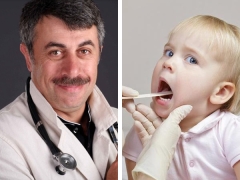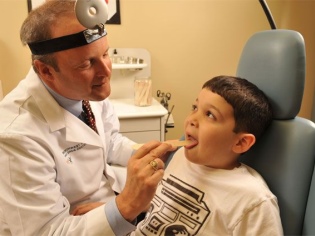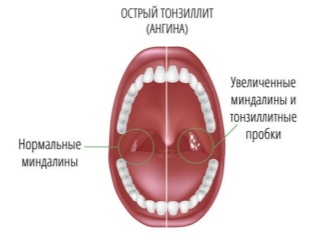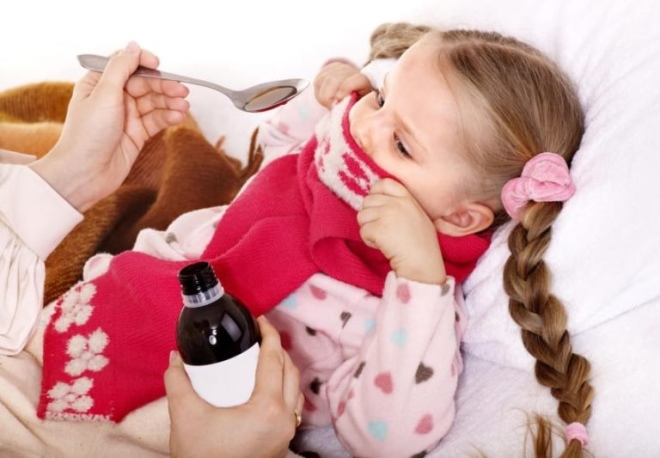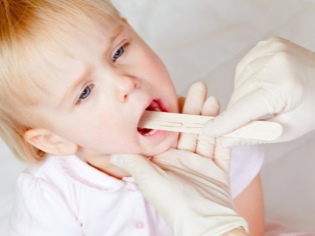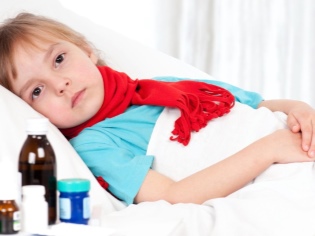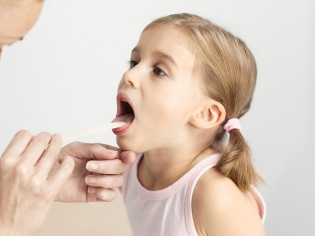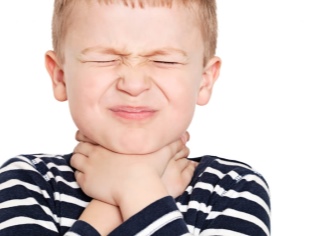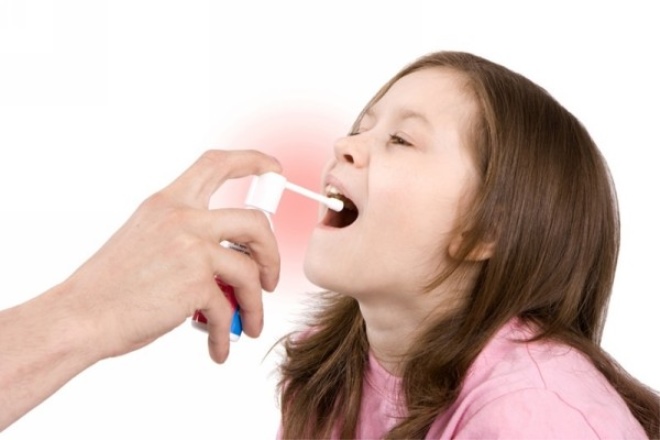Dr. Komarovsky about chronic tonsillitis in a child
Very often parents complain that the child is literally “tortured” by frequent sore throats. He ate cold - his throat was red and sore, shouted a little on the street - the result is the same, and if he caught a cold and got sick, then these symptoms appear on a mandatory basis. Yevgeny Komarovsky, a well-known children's doctor and author of books on children's health, argues that such a thing as “frequent sore throats” practically does not exist, in any case, such an attack happens extremely rarely. And what mothers and fathers usually describe when they come to the reception or write letters is another name - “chronic tonsillitis”.
What it is?
Angina, although it bears the official medical name “tonsillitis,” it differs from chronic tonsillitis. Angina always has an acute course, and chronic tonsillitis is the result of a prolonged inflammatory process that develops in the tonsils of the palatine and pharyngeal. This ailment can be a consequence of not only transferred angina, but also scarlet fever, measles, diphtheria. Sometimes chronic tonsillitis develops independently, without prior acute illness.
By itself, the disease is simple and complicated.
If a child often just has a sore throat or a sore throat, difficulties in swallowing, then it is a simple form. If a regular concomitant enlargement of the lymph nodes in the neck and under the jaw, fever, and pathologies of certain internal organs, such as the heart, ear, and nasal sinuses, are added to the sore throat when swallowing, then we can speak of a toxic-allergic form.
Various pathogens are capable of causing the disease:
- bacteria (pneumococci, moraccella, streptococci, staphylococcus, hemophilus bacillus);
- viruses (adenoviruses, Koksaki virus, Epstein-Barr virus, virus herpes);
- fungi, chlamydia, mycoplasma.
The likelihood of developing the disease increases if the child has a permanent source of infection in the body, such as: long-term inflammation in the oral cavity, caries, inflammation in the sinuses, and frequent breathing difficulties. Often, chronic tonsillitis develops in children who are intoxicated, inhale strong allergens and chemicals. Breathing dusty and polluted air also increases the chance of illness.
The state of immunity also plays its role - if it is strong enough, then the likelihood of developing chronic tonsillitis is lower. If baby often sick respiratory viral illness, ailment becomes more likely. Also, if the child is sitting on cold surfaces, supercooled, then he again falls into the risk group.
Exacerbations of chronic tonsillitis, according to Evgeny Komarovsky, occur when local immunity is weakened, when a child becomes ill with a viral infection and the protective properties of the mucous membranes are violated. If saliva is not enough, or it has a thick consistency, then its protective functions are impaired, which means that pathogenic microbes and viruses can safely do their “dirty deed”.
Symptoms
Parents and doctors can suspect chronic tonsillitis in a child not only by the frequency of complaints of a sore throat, but also by characteristic signs. Usually 2-3 symptoms from the list below are enough for such a diagnosis to be entered in the baby’s medical record:
- palatine arches grow in size and thicken. In this state, they can be not only in the acute stage, when the throat is really sore, but also in remission;
- spikes appear between the tonsils and palatal arches. This is easily noticed by any pediatrician who peeks into a child’s throat;
- tonsils themselves may have a loose appearance. The second option - the scars on the tonsils;
- caseous pus plugs may form in the tonsilswhich look like white or yellowish-gray round spots, often filled with liquid pus;
- lymph nodes under the jaw and on the neck, on which the function of lymph discharge from the inflammation focus lies, is enlarged and painful with a slight pressure.
More than a hundred of various diseases are known to medicine, which are due to their appearance precisely to chronic tonsillitis. These associated illnesses have their own specific signs and symptoms. Nephritis, hyperthyroidism, psoriasis, eczema, scleroderma, systemic lupus erythematosus, rheumatism can be attributed to the "gifts" from existing tonsillitis.
Treatment
Curing chronic tonsillitis is difficult, but possible. The main rule - therapy should be systemic, consistent and persistent.
Most often, the child is shown conservative treatment. This includes various rinsing, tonsil irrigation. If the culprit of tonsillitis is a bacterium, antibiotics can be given to the child. True, this should happen strictly after the tests for bacterial sore throat are ready. Only after finding out which microbe is “guilty” of the disease, the doctor will be able to select an antibacterial drug that will act on this particular pathogen.
Courses of treatment for the baby are prescribed twice a year, most often in the spring and autumn. If he has complicated chronic tonsillitis, then up to 4 courses of therapy can be given per year.
Among antiseptics, doctors often recommend a solution of lugol. Yevgeny Komarovsky urges parents to stop using this drug because it is ineffective, like most other antiseptics for chronic tonsillitis. In addition, the solution of Lugol can be extremely dangerous for the child's body, since iodine, which is contained in it in large quantities, can cause disruptions in the function of the thyroid gland.
Yevgeny Komarovsky claims that all antiseptics with which they can advise on the treatment of tonsils have no significant effect on the healing process. If a source of inflammation is found and it is bacterial, then antibiotics should be treated. If viruses are to blame, then specific medication treatment is not required.
In any case, parents should throw all their efforts to strengthen local immunity, because there is no better medicine than their own saliva for a child with chronic tonsillitis. To prevent saliva from drying out, Komarovsky recommends:
- to reorganize the oral cavityby visiting a dentist;
- follow the drinking regime - A child with such an illness should drink warm drinks a lot and often;
- tidy up the microclimate in the apartment. Local immunity will work as it should, and saliva will not dry out if the baby does not breathe dry air and sleep in a room with three heaters and a tightly closed window leaf. The best conditions are air temperature — 18–20 degrees, relative air humidity — 50–70%;
- walk more often in the open air, remove all things from the house that can accumulate dust and pollute the air - soft toys, carpets, books that are not stored behind tightly closed cabinet doors;
- Do not use household chemicals containing chlorine.
Sometimes, fortunately, quite rarely, surgical treatment is recommended for the child. In the case of a strong growth of the tonsils, they can be removed quickly. This procedure is called tonsillotomy or tonsilloectomy.During the operation, the surgeon completely or partially removes the affected tonsils, which are the source of infection.
Indications for surgery are few: serious complications from the internal organs, complete cessation of the protective functions of the tonsils. The operation does not belong to the category of complex, the recovery period is rather fast. Forecasts after it are most often favorable.
More information about the removal of tonsils in children with tonsillitis and the disease itself will tell Dr. Komarovsky in the next video.
Prevention
Yevgeny Komarovsky advises the parents of toddlers not to forbid the child to eat cold food, drink water from the refrigerator, since it is ice cream that is tasty and useful medicine for increasing the local immunity of the larynx and tonsils. It is quite possible for them not only to pamper the child, but also to temper the throat. Chad who drink warm all the time and eat pureed, chronic tonsillitis is much more common.
In the period of mass incidence of viral infections of the respiratory type, it is worthwhile to protect the child from visiting places where a large number of people gather, especially if the meetings are held indoors. It is not necessary to drive a child at this time to large shopping centers, to carry on public transport without urgent need, but walking in the park, away from the crowd, are welcome.
Viral infections, since the child has become infected with them, cannot be treated with antibiotics - this increases the likelihood of developing chronic tonsillitis, and if your child has a sore throat, it should be treated with a doctor, correctly, and not on the Internet according to the recipes of traditional healers.
The best prevention of chronic tonsillitis, which is easier to prevent than to cure, is to harden the child from an early age, to observe the rules of a balanced and proper diet, rich in vitamins and microelements. Runny nose, even the smallest, should be treated quickly and correctly, and caries, stomatitis and any other inflammatory processes in the mouth should be eliminated as soon as possible.
